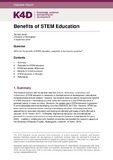| dc.contributor.author | Ismail, Zenobia | |
| dc.coverage.spatial | India | en |
| dc.coverage.spatial | Ghana | en |
| dc.coverage.spatial | Rwanda | en |
| dc.date.accessioned | 2019-01-11T10:28:54Z | |
| dc.date.available | 2019-01-11T10:28:54Z | |
| dc.date.issued | 2018-09-04 | |
| dc.identifier.citation | Ismail, Z. (2018). Benefits of STEM Education. K4D Helpdesk Report. Birmingham, UK: International Development Department | en |
| dc.identifier.uri | https://opendocs.ids.ac.uk/opendocs/handle/20.500.12413/14258 | |
| dc.description.abstract | The literature on STEM education in developing countries focuses on the challenges many young people face with regard to access to secondary and tertiary education in general as well as the gender gaps in STEM education. It therefore proposes strategies for overcoming these difficulties. Studies on STEM education usually adopt a regional focus such as Africa or Asia and therefore the reports amalgamate data from middle-income and low-income countries. There is some literature on the benefits of science and technology (as a sector) on economic growth or combating diseases such as HIV or malaria. The literature does not discuss the benefits of STEM education beyond the general view that STEM facilitates economic growth and competitiveness. Given that the literature does not address the query directly, the following approach is used in this rapid literature review: literature from developed and developing countries is used to discuss the rationale for STEM education and the key trends in this field. Statistics relating to the gender gap are presented and the impact of some programmes which aim to improve female participation in STEM in developing countries is discussed. Since much of the literature on STEM education mentions teacher training, this is discussed as a benefit of STEM education, together with meeting the demand for skills and innovations for secondary education. Case studies of STEM education projects in Rwanda, a low-income country which has prioritised education and undertaken several initiatives to improve STEM education, are used to highlight the benefits of STEM education. | en |
| dc.language.iso | en | en |
| dc.publisher | IDS | en |
| dc.relation.ispartofseries | K4D Helpdesk Report;418 | |
| dc.rights.uri | https://www.nationalarchives.gov.uk/doc/open-government-licence/version/3/ | en |
| dc.subject | Economic Development | en |
| dc.subject | Education | en |
| dc.subject | Gender | en |
| dc.subject | Rights | en |
| dc.title | Benefits of STEM Education | en |
| dc.type | Helpdesk | en |
| dc.rights.holder | © DFID - Crown copyright 2018. | en |
| dcterms.dateAccepted | 2018-09-04 | |
| rioxxterms.funder | Department for International Development, UK Government | en |
| rioxxterms.identifier.project | K4D | en |
| rioxxterms.version | VoR | en |
| rioxxterms.funder.project | 238a9fa4-fe4a-4380-996b-995f33607ba0 | en |

